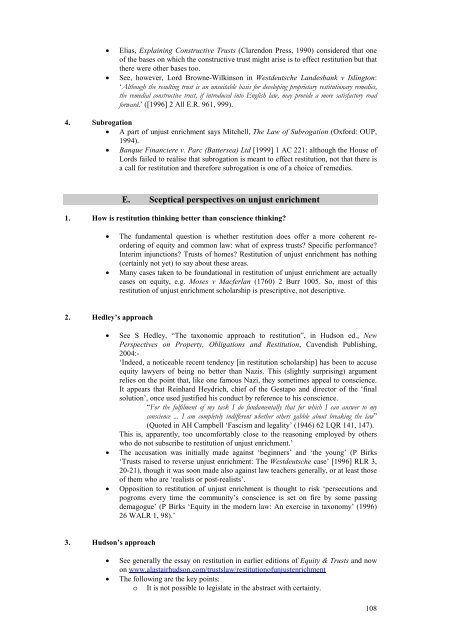Soton Equity and Trusts - alastairhudson.com
Soton Equity and Trusts - alastairhudson.com
Soton Equity and Trusts - alastairhudson.com
Create successful ePaper yourself
Turn your PDF publications into a flip-book with our unique Google optimized e-Paper software.
Elias, Explaining Constructive <strong>Trusts</strong> (Clarendon Press, 1990) considered that one<br />
of the bases on which the constructive trust might arise is to effect restitution but that<br />
there were other bases too.<br />
See, however, Lord Browne-Wilkinson in Westdeutsche L<strong>and</strong>esbank v Islington:<br />
‘Although the resulting trust is an unsuitable basis for developing proprietary restitutionary remedies,<br />
the remedial constructive trust, if introduced into English law, may provide a more satisfactory road<br />
forward.’ ([1996] 2 All E.R. 961, 999).<br />
4. Subrogation<br />
A part of unjust enrichment says Mitchell, The Law of Subrogation (Oxford: OUP,<br />
1994).<br />
Banque Financiere v. Parc (Battersea) Ltd [1999] 1 AC 221: although the House of<br />
Lords failed to realise that subrogation is meant to effect restitution, not that there is<br />
a call for restitution <strong>and</strong> therefore subrogation is one of a choice of remedies.<br />
E. Sceptical perspectives on unjust enrichment<br />
1. How is restitution thinking better than conscience thinking?<br />
<br />
<br />
The fundamental question is whether restitution does offer a more coherent reordering<br />
of equity <strong>and</strong> <strong>com</strong>mon law: what of express trusts? Specific performance?<br />
Interim injunctions? <strong>Trusts</strong> of homes? Restitution of unjust enrichment has nothing<br />
(certainly not yet) to say about these areas.<br />
Many cases taken to be foundational in restitution of unjust enrichment are actually<br />
cases on equity, e.g. Moses v Macferlan (1760) 2 Burr 1005. So, most of this<br />
restitution of unjust enrichment scholarship is prescriptive, not descriptive.<br />
2. Hedley’s approach<br />
<br />
<br />
<br />
See S Hedley, “The taxonomic approach to restitution”, in Hudson ed., New<br />
Perspectives on Property, Obligations <strong>and</strong> Restitution, Cavendish Publishing,<br />
2004:-<br />
‘Indeed, a noticeable recent tendency [in restitution scholarship] has been to accuse<br />
equity lawyers of being no better than Nazis. This (slightly surprising) argument<br />
relies on the point that, like one famous Nazi, they sometimes appeal to conscience.<br />
It appears that Reinhard Heydrich, chief of the Gestapo <strong>and</strong> director of the ‘final<br />
solution’, once used justified his conduct by reference to his conscience.<br />
“For the fulfilment of my task I do fundamentally that for which I can answer to my<br />
conscience ... I am <strong>com</strong>pletely indifferent whether others gabble about breaking the law”<br />
(Quoted in AH Campbell ‘Fascism <strong>and</strong> legality’ (1946) 62 LQR 141, 147).<br />
This is, apparently, too un<strong>com</strong>fortably close to the reasoning employed by others<br />
who do not subscribe to restitution of unjust enrichment.’<br />
The accusation was initially made against ‘beginners’ <strong>and</strong> ‘the young’ (P Birks<br />
‘<strong>Trusts</strong> raised to reverse unjust enrichment: The Westdeutsche case’ [1996] RLR 3,<br />
20-21), though it was soon made also against law teachers generally, or at least those<br />
of them who are ‘realists or post-realists’.<br />
Opposition to restitution of unjust enrichment is thought to risk ‘persecutions <strong>and</strong><br />
pogroms every time the <strong>com</strong>munity’s conscience is set on fire by some passing<br />
demagogue’ (P Birks ‘<strong>Equity</strong> in the modern law: An exercise in taxonomy’ (1996)<br />
26 WALR 1, 98).’<br />
3. Hudson’s approach<br />
<br />
<br />
See generally the essay on restitution in earlier editions of <strong>Equity</strong> & <strong>Trusts</strong> <strong>and</strong> now<br />
on www.<strong>alastairhudson</strong>.<strong>com</strong>/trustslaw/restitutionofunjustenrichment<br />
The following are the key points:<br />
o It is not possible to legislate in the abstract with certainty.<br />
108













